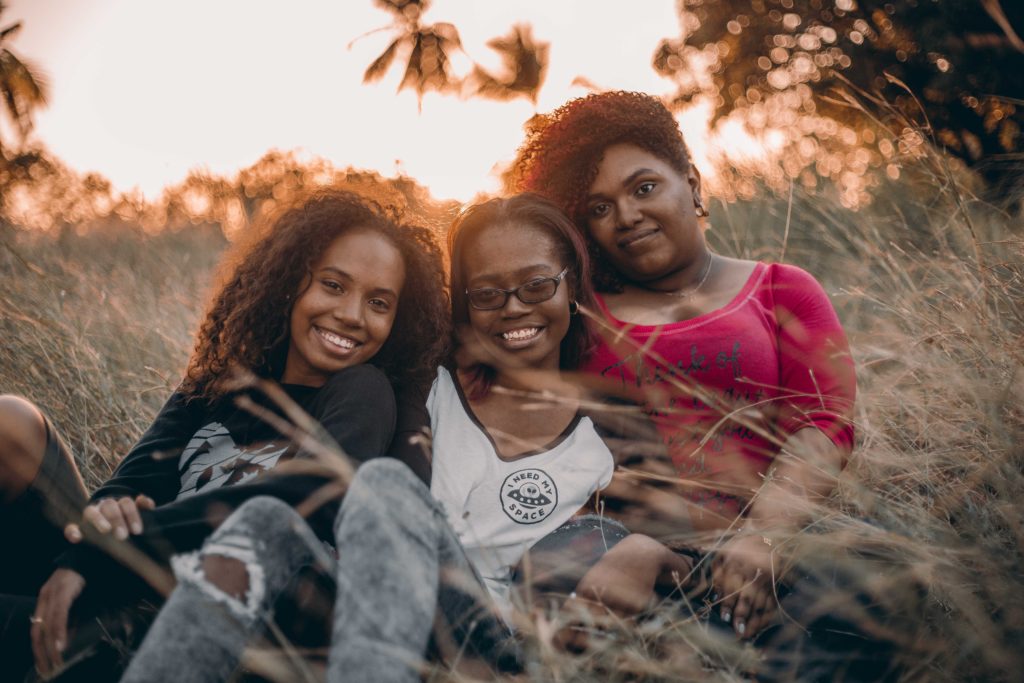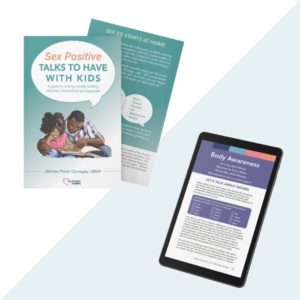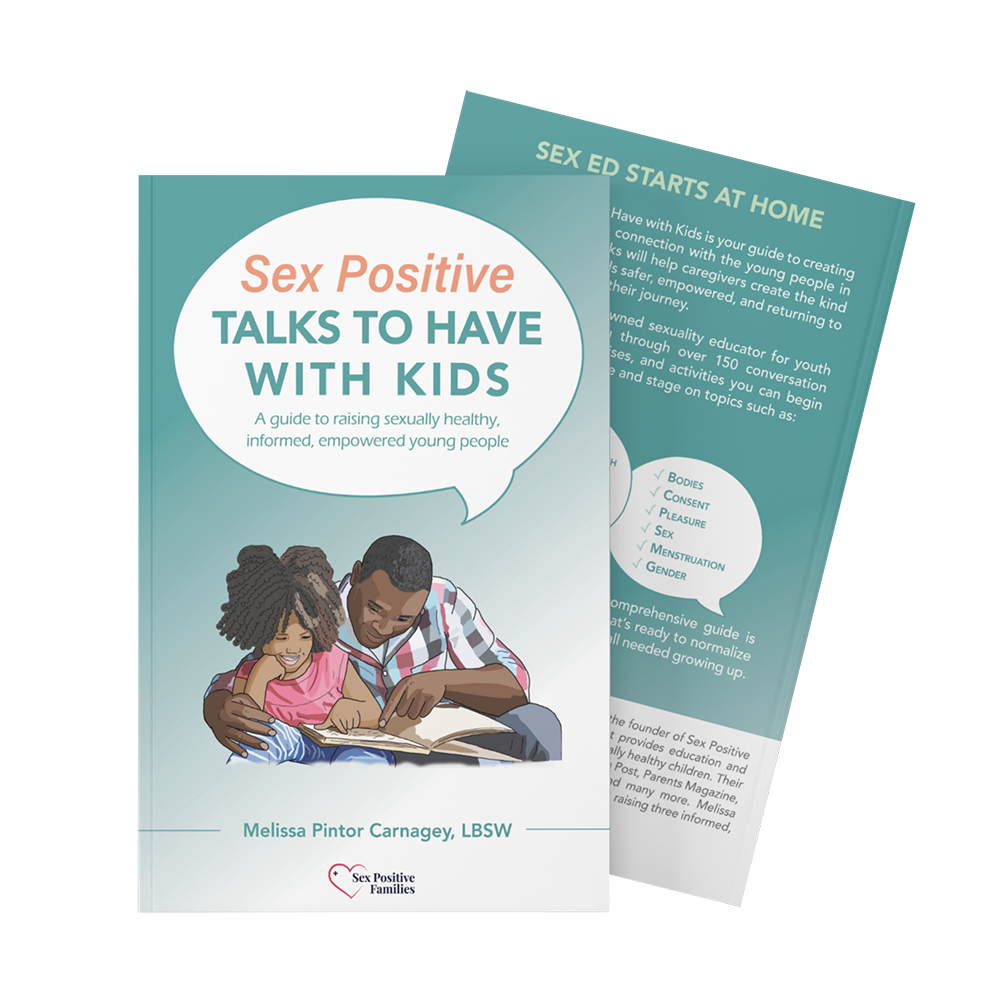-By: Melissa Pintor Carnagey, LBSW-
If you’re parenting today then it’s likely you were around in the 90’s when Salt-N-Pepa made the concept of talking openly about sex a hip and catchy tagline. And though it sounds like an ideal way to break taboos, adults can feel hesitant about actually talking about sex, especially with the children in their world. Why is this, and how can parents get out of their heads and into supportive action? Here are eight of the most common reasons caregivers express for avoiding or delaying sexual health talks (and what you can do about it):
”I’ll just wait until they’re older”
When parents understand that a person’s sexuality is lifespan, not simply a phase that starts at puberty, they become clearer about the opportunities available to foster a child’s sexual health early and ongoing. From teaching accurate names for a child’s genitals, to modeling consent in everyday life, sexuality education is about more than just sex or reproduction. It’s available through teachable moments that begin early, before it’s even about sex.
”If I talk about it, they’ll want to do it”
Some parents worry that if they acknowledge the topics of sex or sexuality with young people, it will lead to early sexual behavior. Nothing is further from the truth. Research finds that when young people receive education and support specific to their sexual health, they are more likely to delay their sexual debut, use contraception when they do have sex, and be thoughtful about the number of sex partners they engage with. Talking with young people prepares them for informed decision making and lets them know you are a trusted adult they can turn to for support along the way.
”They haven’t asked about it so…”
If you’re waiting for a child to come to you about sex, ask yourself if you’re creating the kind of environment that is safe for a young person to be curious without fear of punishment, judgment, or ridicule. Children learn quickly how to navigate their world and the adults in it. If you have an elementary student or tween, especially one who is going to school outside of the home, and they haven’t brought their questions your way, it’s time to open up the conversations so they see you as a safe, taboo-free resource. If you have an infant, it’s not too early. Start by ensuring you are using accurate names of genitals when you’re changing or bathing them; set clear boundaries regarding consent when others interact with your child. Create a culture of sexual health at home and their curiosities will have a safe space to land along the way.
”The school will teach them”
The sad reality, especially in the US, is that schools are falling short. Only 26 states and the District of Columbia currently mandate sex and HIV education in public schools. Furthermore, only 18 states require the content to be medically accurate. WTF?! Our young people receive all levels of math, more than they will ever use in their adult life, but are shortchanged when it comes to learning about their bodies, consent, healthy relationships, and sexual decision making- vital skills for health, safety, and quality of life. Families must play an active role, early and ongoing, to ensure young people are prepared, not scared, along their journeys.
”Kids don’t want to talk to parents about this!”
Just because you may still dread the thought of talking about sex with a parent (and you’re a grown-up now!) doesn’t mean young people don’t want to have support from key adults in their world. Power to Decide surveyed over 3,000 young people ages 12-15 asking them who they felt the highest influencers were when it came to their sexual decision making. 52% said parents. Friends came in at 17%. A similar sample size of adults were asked the same question and they overwhelmingly assumed that young people said their friends were the highest influencers. This tells us that youth want to talk to their parents, and parents often underestimate their influence. Moral of the story: Talk to your young people. They need us.

”I don’t have the same genitals, so I can’t teach them”
You can absolutely educate your child about all bodies, regardless of who has what parts. Any details you’re unsure of, you can look up together. Some of our favorite reads to start body awareness talks early are Your Whole Body; These Are My Eyes, This is My Nose, This is My Vulva, These Are My Toes; and Vaginas and Periods 101: A Pop Up Book. Breaking misogyny, toxic masculinity and harmful gender stereotypes begins with educating every child (and ourselves) about ALL bodies, without avoidance, secrets, or taboo.
”It’s too awkward”
Lots of self-compassion here. Many adults of today did not grow up with sex ed, let alone comprehensive sex ed. How can we teach what we didn’t learn ourselves?! Factor in also the many of us who had repressive religious upbringings and/or childhood trauma. The experience of parenting can be triggering AF, which absolutely contributes to how comfortable we can feel in tackling these talks. It’s important to always remember that you are on your own sexual health journey as well. Nurture it. It’s not too late to connect with the sex education and support you need to build comfort and confidence. Whether it’s through counseling spaces, connecting with your body, journaling, reading sexual health books, or taking workshops for adults, never stop the learning and healing. The talks we have with our young people are about bodies, identities, and how we navigate interpersonal relationships- natural aspects of being human. They’re only awkward if we keep them awkward.
”I don’t know what to say”
Keep this in mind, children aren’t looking for us to be encyclopedias. They just want to know we are safe, reliable people they can come to as they need us. Any information you don’t know, you can look up together. You can find many options right here on our site or browsing this list of the 10 Best Sex Ed Resources for Families. A wealth of support exists to make the talks age-congruent and even fun.
Be the powerful sexual health influencer for a child in your world. You can totally do this! What talk will you have today?
 For a guide made just for parents and caregivers to tackle sexual health talks at every age and stage, check out our bestselling book Sex Positive Talks to Have With Kids: A guide to raising sexually healthy, informed, empowered young people.
For a guide made just for parents and caregivers to tackle sexual health talks at every age and stage, check out our bestselling book Sex Positive Talks to Have With Kids: A guide to raising sexually healthy, informed, empowered young people.

Sex Positive Talks to Have With Kids is the bestselling guide to creating an open, shame-free connection with the young people in your world.
It’s an inclusive, medically accurate, and comprehensive resource that walks you through over 150 conversation starters, reflection exercises, and activities you can begin implementing at every age and stage to normalize sexual health talks and become the trusted adult we all needed growing up.
